Items
Date is exactly
2020-05-17
-
2020-05-17
Bells, Breezes, and Sirens
The warmest April on record, yet we were all stuck inside. The streets usually congested with the honks of angry black cabbies, the loud hum of overused mufflers on double decker buses and the low rumble of the tube running underfoot were silent. The metropolis of over nine million people had come to a standstill. Windows usually closed to protect against the sleet or smog, were opened to quiet clean breezes. London felt serene, almost idyllic, until the piercing siren of an ambulance run would cut through that fairytale. Before COVID I never paid attention to the St. John’s Ambulance First Aid Training facility on my street, only occasionally seeing the paramedics pop in the Arabic supermarket next door during lunch. As the news was counting the number of days we were in lockdown, I started counting the number of ambulances lining my street; popping my head out the open windows, looking up and down the road. However, sitting in my favorite chair in my flat, back to the window, I could avoid the grim sight, a constant reminder of the reality of the pandemic. I would take my tea in that purple chair, alternating between endless Netflix shows and books, the church bells across the street the only thing to remind me of time. The warm sun and smog less breeze would join the bells drifting through the open windows. Through the books and shows, I not only escaped COVID but my small London flat. The silence of the city amplifying my imagination, only to be shattered by that first initial scream of the sirens, jolting me back to reality. Willing to sacrifice the warm breeze at my back, I closed my windows to protect my ears and the fantasies I had created. However, the double paned windows, sturdy enough to block out the honks of angry black cabbies, were no match for the sirens. Unable to even slightly defend against the shock of the sirens when surrounded by the new silence of the city, I learned to live with it. I reopened my windows to let in bells, breezes, and sirens, instead tuning my ear to notice the ambulance’s first turn of the engine to brace for the piercing scream that would soon follow. As the days continued, my ears started to acclimate to this new normal, with each ambulance run making me jump a little less off my chair. Though my body and mind would never accept the sound enough to not to jolt me even from the deepest sleep, as if to remind me that this was anything but normal. -
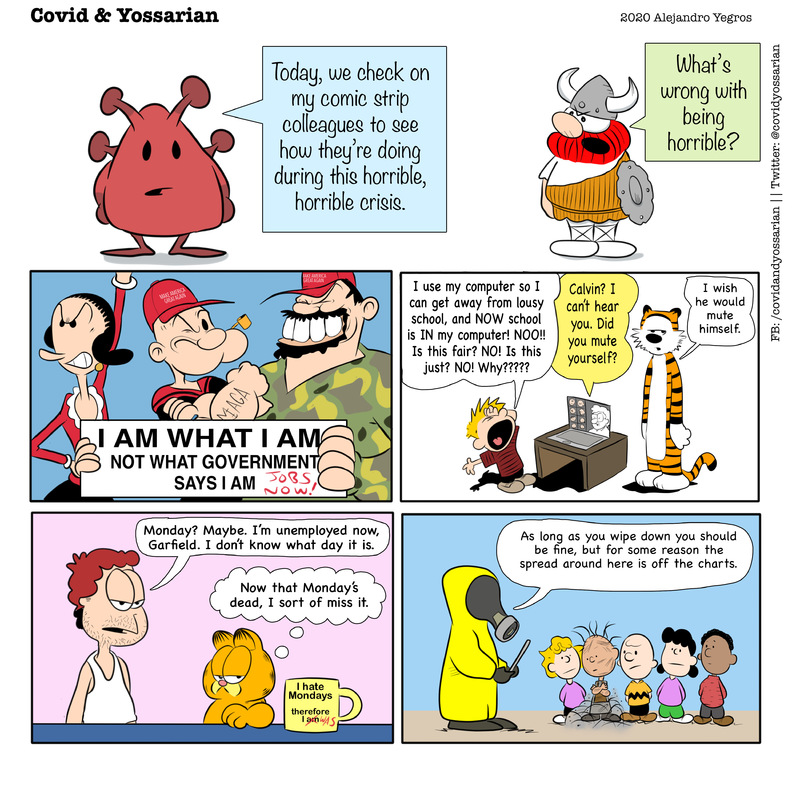 2020-05-17
2020-05-17Where are they now?
A comic strip about Covid-19 -
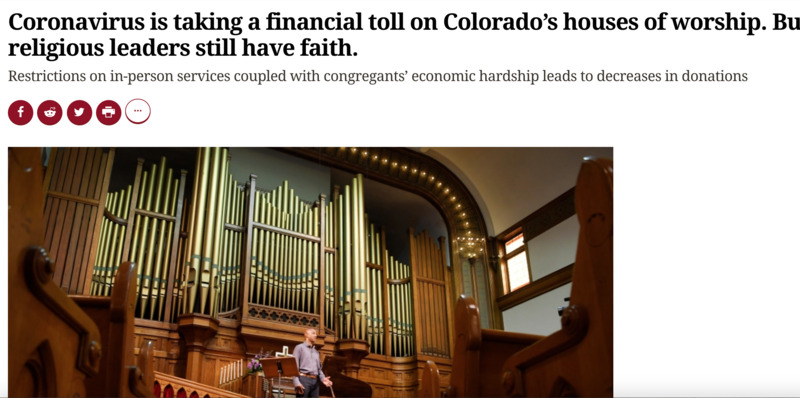 2020-05-17
2020-05-17Coronavirus is taking a financial toll on Colorado’s houses of worship. But religious leaders still have faith.
During the pandemic, many places of faith are on the verge of closing their doors permanently. As people lost jobs, giving obviously declined. Because houses of worship rely entirely on giving, this has created a crisis for many churches, mosques, synagogues, and temples. These houses of faith still have bills to pay, they have employees to pay, and the vast majority of these houses of faith contribute significantly to their community. This article speaks to the uphill battle being faced specifically by places of faith in Colorado during the pandemic. -
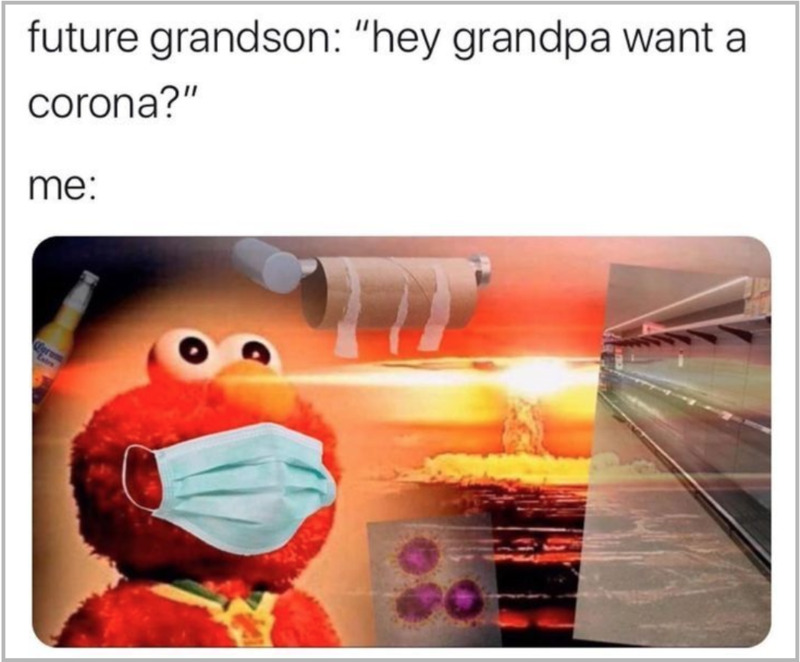 2020-05-17
2020-05-17Funny corona beer meme
HIST30060 - submitted as part of a history assignment. This meme uses symbolism in order to compare the pandemic to disastrous world events. The background depicts an atomic bomb exploding into a mushroom cloud and is overlaid with photographs of an empty toilet roll (alluding to the rush on toilet paper that occurred early in 2020), a bottle of Corona beer (a company unfortunate enough to share a name with the virus), empty shelves (from where people had panicked bought), graphics of the virus and the muppet Elmo wearing a mask, looking into the middle distance. The combination of these graphics suggests that in the future, ‘corona’ will be inextricably linked to the virus and that just saying its name will induce traumatic flashbacks. This suggests that the collective experience of wider society this year could be deemed a sort of shared trauma. It is noteworthy that the vast majority these memes, this one included, do not make light of personal hardships faced by people in order to be malicious and the events alluded to (such as the food hoarding) are not “serious” (like, for example, the economic crisis or the coronavirus death toll) but more trivial inconveniences. -
 2020-05-17
2020-05-17Time to Watch Calcio
I'm not one to watch sports, but I do love futbol, or calcio as my favorite Italians call it. During the pandemic, as professional sports have been cancelled, and then gradually brought back in, my husband and I added ESPN+ to our streaming in order to watch SERIE A finish the 2020 season (albeit late) and then recently start again. Doing so has brought a sort of life to our home lockdown. We both love hearing the sounds of the games in the background and cheering on our favorite teams. New this year as a result of the pandemic are the club's choices as to how (or if) they add in dubbed sound, and getting used to that has been interesting. Some might filter in synthetic crowd noises (which hasn't been as bad as I would have thought). Where there has not been any sound, the feel of the game is definitely not the same, however now it is interesting to follow the players and coaches' communication firsthand. My link shares an article in which a few of the team members from my favorite team, Parmia Calcio, were recently diagnosed with COVID and what occurred following. -
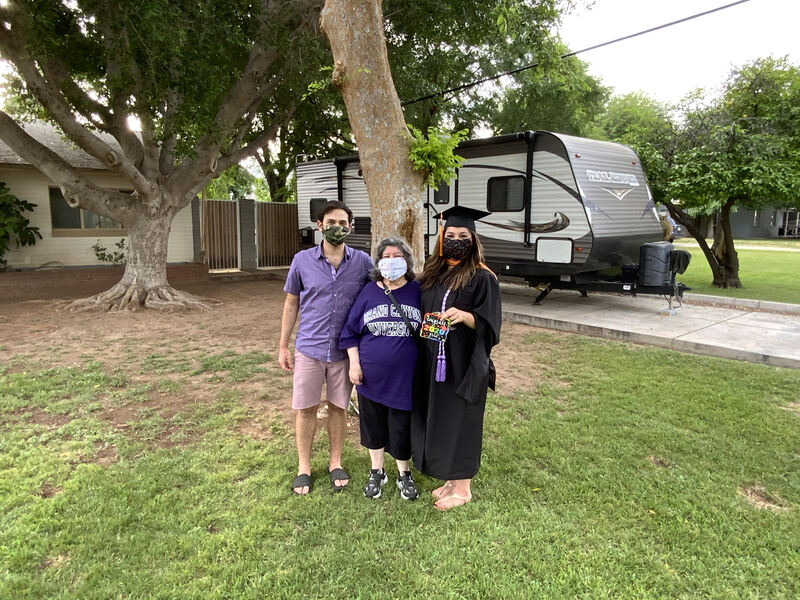 2020-05-17
2020-05-17Graduation during Covid-19
My sister has been working so hard for the past two years; late nights and difficult early morning labs. She earned the title nurse practitioner. The pandemic hit a few months before her graduation and she would work the front lines while taking the last push towards graduation. As expected her graduation was cancelled and she was mailed her practitioner license. My family and I thought that her hard work deserved a proper celebration so we planned a way for our family to get together but follow all the proper precautions. We saw those drive by celebrations and planned one of our own. My grandmother demanded to be apart of the crowd at home to be closer to her granddaughter and no could tell her any different. This is one of the pictures from the celebration. -
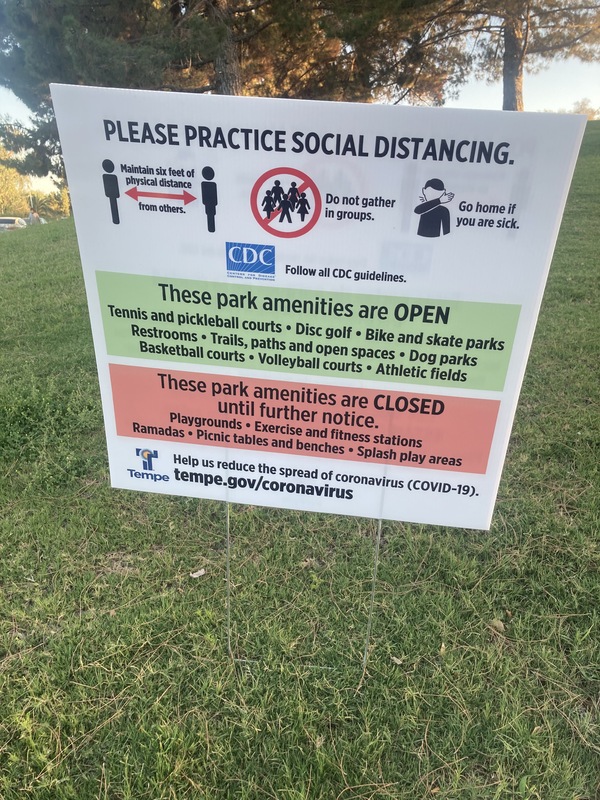 2020-05-17
2020-05-17An Afternoon at Kiwanis Park
After weeks of quarantine at home, my partner and I decided to try and get out of our house and do something fun. We decided that a park would be most safe, so we donned our masks and headed to Kiwanis Park in Tempe to play some Pokemon Go. Although there were there numerous signs outlining specific measures to keep park-goers safe, the park was split about 50-50 in terms of people wearing and not wearing masks. As we left the park, I heard one woman loudly complaining to her friend "So now I'm supposed to prioritize other people's safety over my comfort?" She was, of course, not wearing a mask. -
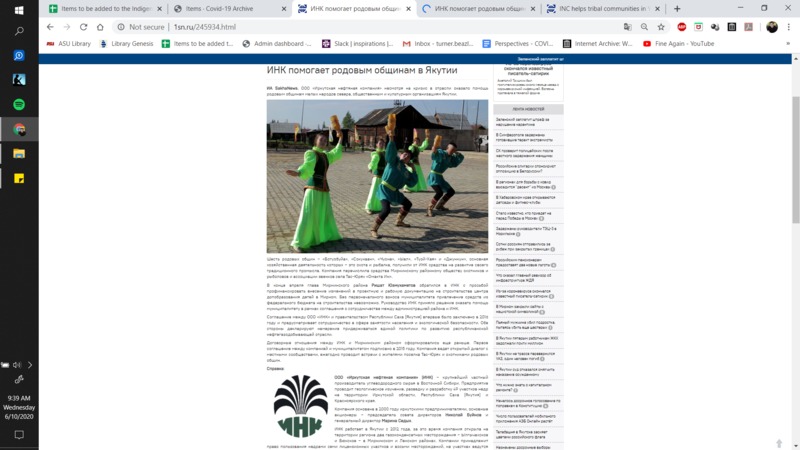 2020-05-17
2020-05-17INC helps tribal communities in Yakutia (ИНК помогает родовым общинам в Якутии)
"Irkutsk Oil Company LLC, despite the crisis in the industry, provided assistance to tribal communities of small peoples of the north, public and cultural organizations of Yakutia." -
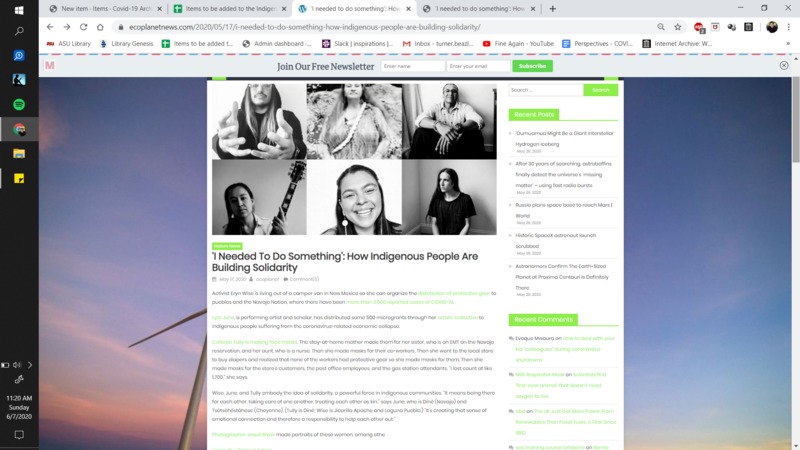 2020-05-17
2020-05-17I needed to do something': How Indigenous people are building solidarity.
"One elder, his uncle, encouraged him to check in on indigenous people he knew. “That’s one of your medicines,” Rivas says his uncle told him. “You’re good at that.” Another, his friend Pualani Case, who is Hawaiian, reminded him that indigenous people practice solidarity." -
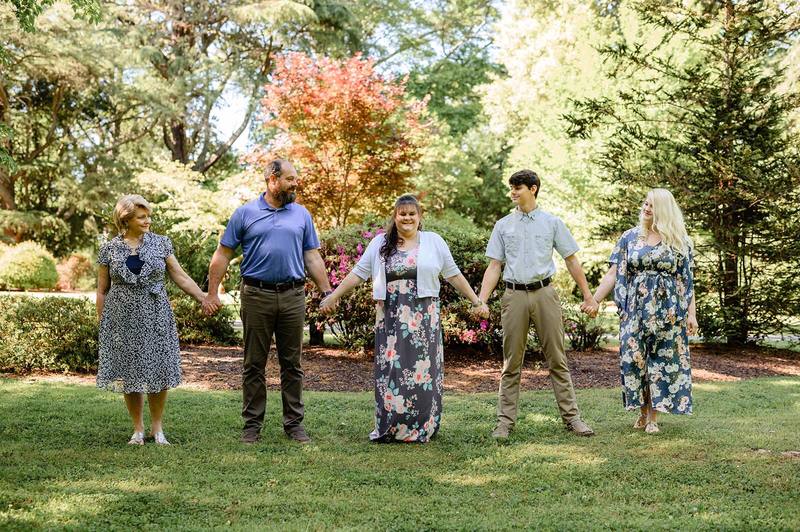 2020-05-17
2020-05-17Social Distancing
This is a photo that a good friend of mine, Katie DiPietro took during a family session where she was required to stay 6ft away and give ten min session breaks for clean up. She called this pose the "social distancing pose"...as you can see my family thought it was very funny. This session was brilliant because for a short moment, we forgot all about the virus. The fear and worry went away and for half an hour, we could enjoy extra time as a family. -
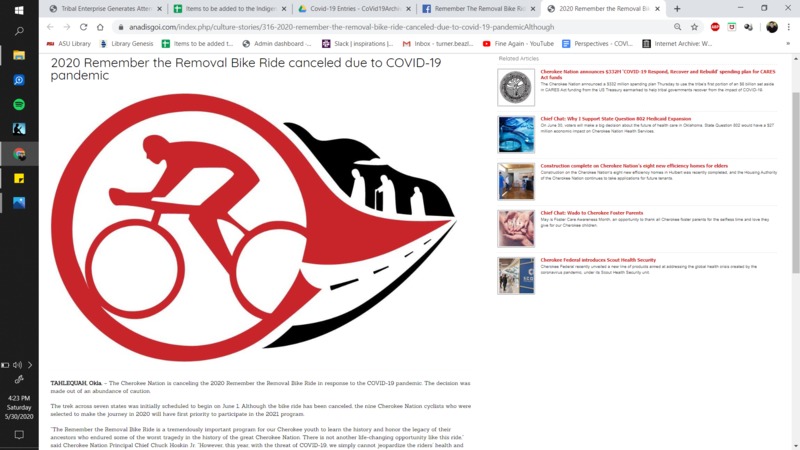 2020-05-17
2020-05-17Cherokee Nation Cancels 2020 Remember the Removal Bike Ride
The Cherokee Nation is canceling the 2020 Remember the Removal Bike Ride in response to the COVID-19 pandemic. The Remember the Removal Bike Ride is a youth leadership program that retraces the Northern Route of the Trail of Tears. -
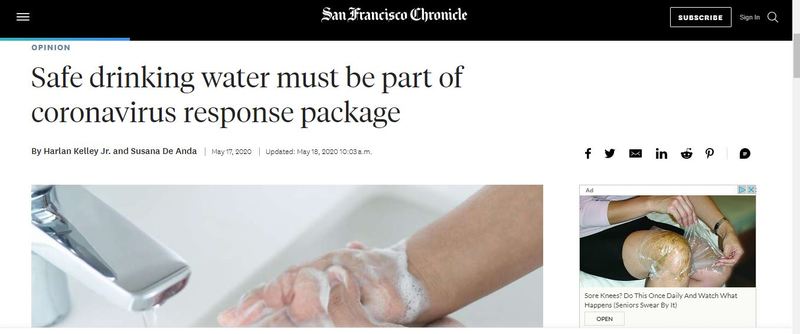 2020-05-17
2020-05-17Safe drinking water must be part of coronavirus response package
Access to water must be included as part of the next major federal legislative package. We cannot expect to halt the spread of the COVID-19 pandemic without water for handwashing and basic sanitation. I am even more interested in how this is going to be administered to the Navajo Reservation that continues to struggle with COVID deaths as a result of limited access to water. In some place, zero access to clean and safe water for hygiene and sanitation. -
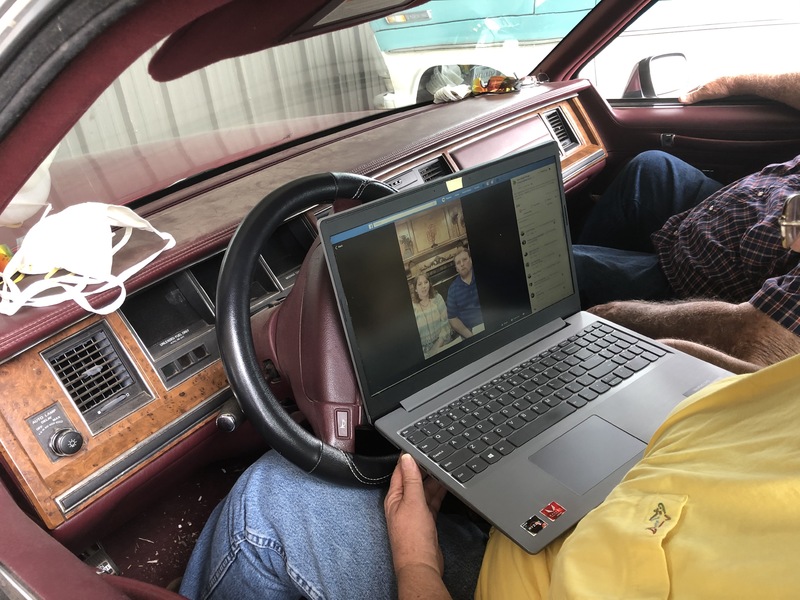 2020-05-17
2020-05-17Rural Oklahoma Church Members Attend Online Services During COVID-19
Sharon and Dan Annesley of Blanchard, Oklahoma attend online services of New Beginnings Church. The Blanchard area church began offering Facebook Live streaming of their services starting 03/22/2020 and continued until 05/17/2020. Before March neither of them had ever attended an online church service, but it soon became a weekly routine during the COVID-19 restrictions. For nearly two months, Sharon and Dan attended the services each Sunday morning by driving to a local area for access to Wi-Fi and viewing on their laptop from the car. The photo captures the last time members Sharon and Dan attended online services before Oklahoma's COVID-19 restrictions were lifted for churches. Starting 05/24/2020, limited in-person services for New Beginnings Church reopened on 05/24/2020 as online streaming simultaneously will continue. -
2020-05-17
More Time for Hobbies [MISSING MEDIA]
The pandemic is obviously a bad thing. However, there have been a little bit of good that has come out of it. For example, many people now have the time to revisit and develop hobbies that they previously never had time for before the pandemic. Perhaps, they've even picked up new ones. For me, I got the chance to improve my photography and editing. I couldn't shoot people for obvious reasons, so I took my car out instead! The quarantine has definitely given myself and many others a chance to invest more time into the hobbies that we enjoy doing. -
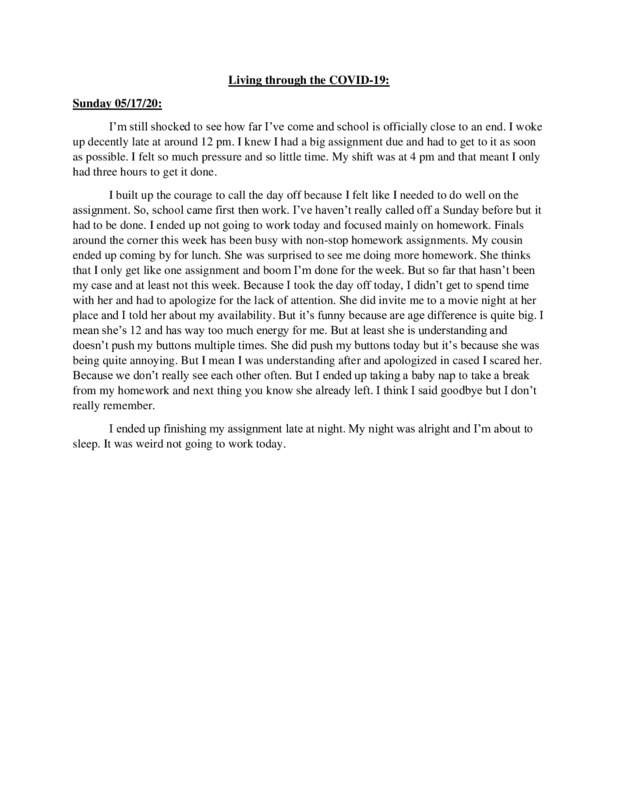 2020-05-17
2020-05-17Living through Covid-19: 05/17/2020
This is a journal entry that specifically focuses on the transition to online learning and the practice of social distancing. *anonymous *This was intentionally a journal/diary entry therefore it was done through a word doc. -
 2020-04-06
2020-04-06Living through Covid-19: 05/12/2020
This is a journal entry that specifically focuses on the transition to online learning and the practice of social distancing. *anonymous *This was intentionally a journal/diary entry therefore it was done through a word doc. -
 2020-04-06
2020-04-06Living Through Covid-19: 04/11/2020
This is a journal entry that specifically focuses on the transition to online learning and the practice of social distancing. *anonymous *This was intentionally a journal/diary entry therefore it was done through a word doc. -
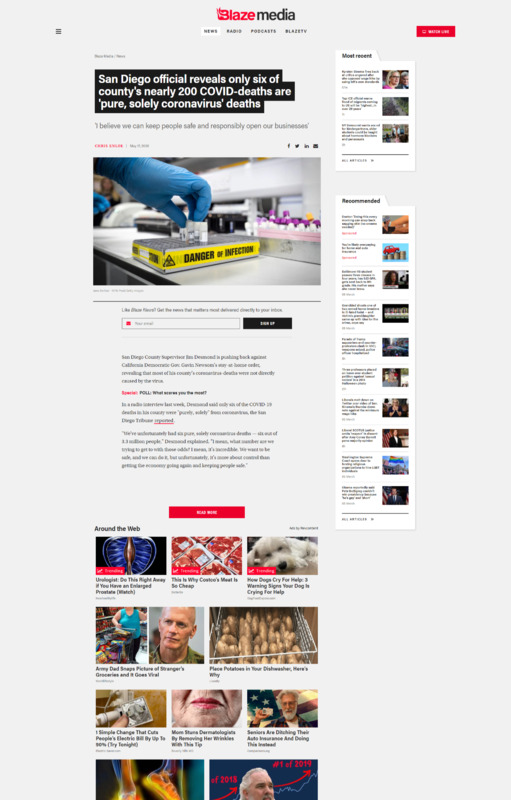 2020-05-17
2020-05-17San Diego official reveals only six of county's nearly 200 COVID-deaths are 'pure, solely coronavirus' deaths
What is a true Coronavirus death? Arizona State University, HST 580. -
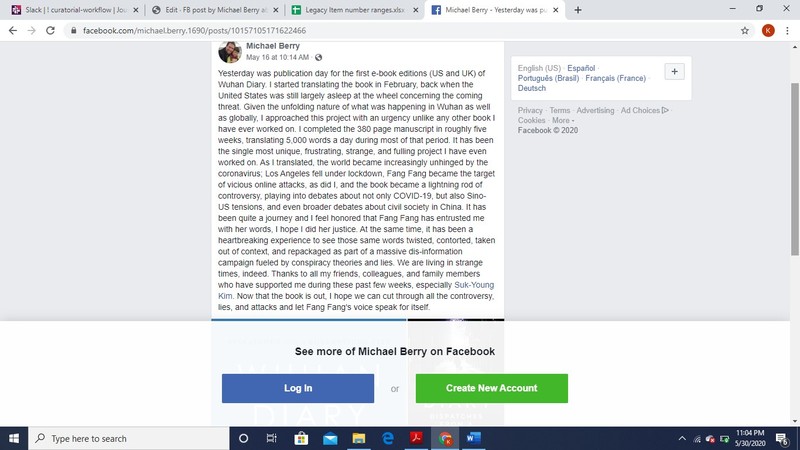 2020-05-17
2020-05-17FB post by Michael Berry about the Wuhan Diary
Facebook post by Dr. Michael Berry, translator of Fang Fang's Wuhan Diary: Dispatches from a Quarantined City, as it was released (in English) on May 17. -
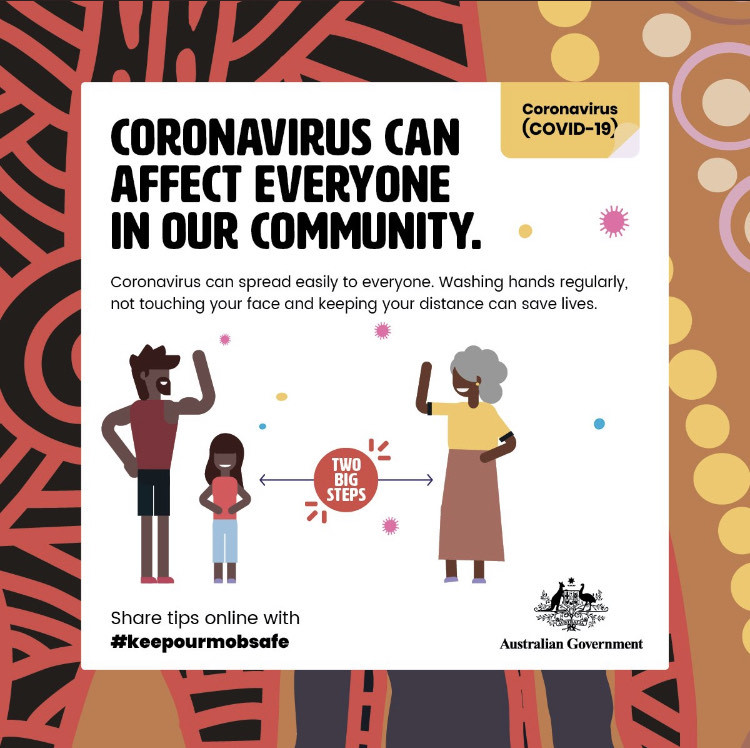 2020-05-17
2020-05-17#KeepOurMobSafe Campaign
The Australian Government has launched a campaign to #keepourmobsafe. This image is of a screenshot of an ad for the campaign, which the government is using to educate Indigenous Australians of the risk of Covid-19. The ads appear to be targeting Indigenous Australians living in remote communities, giving them tips on how to stop the spread of Covid-19. The campaign utilises indigenous artwork and slang to appear 'relatable'. -
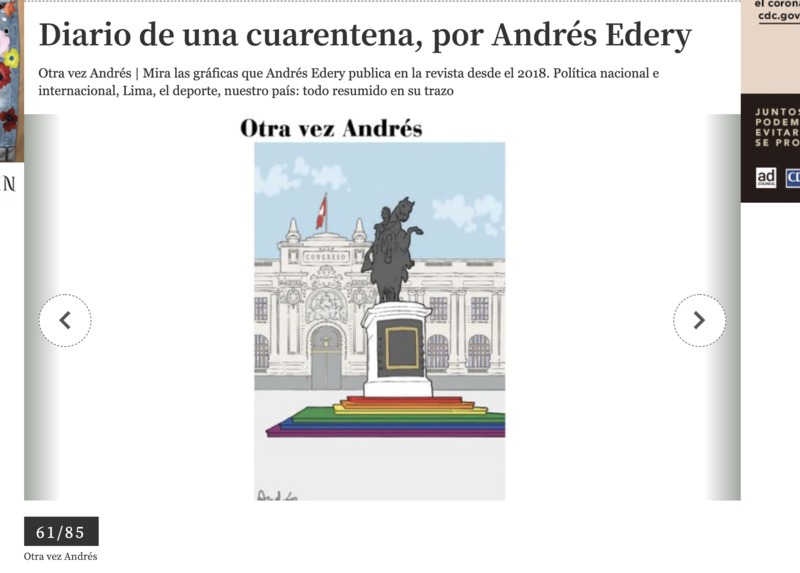 2020-05-17
2020-05-17Fifth set in Diario de una cuarentena, por Andrés Edery
Image 61-80 in Diario de una cuarentena, por Andrés Edery posted by El Comercio Peru -
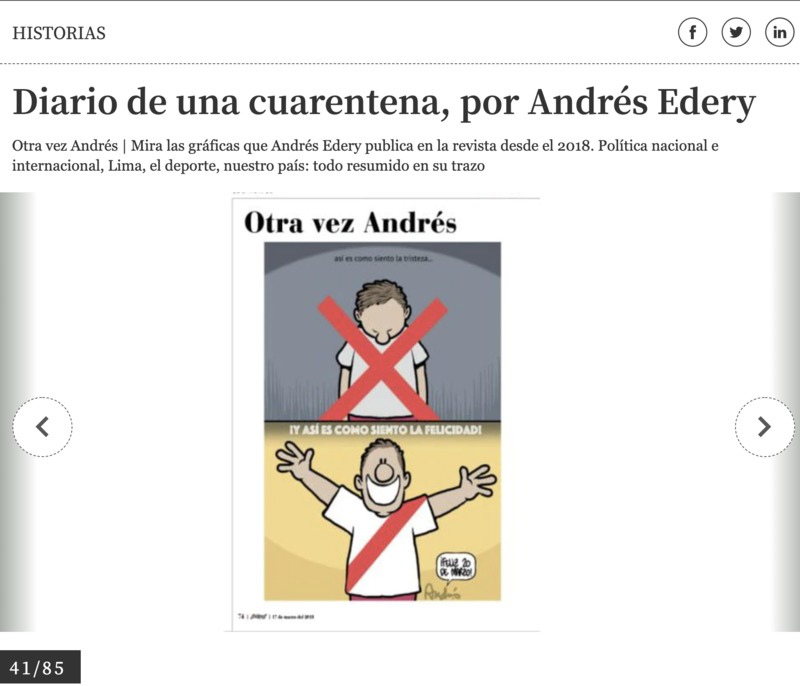 2020-05-17
2020-05-17Fourth set Diario de una cuarentena, por Andrés Edery
Items 41-60 in Diario de una cuarentena, por Andrés Edery, a series of political cartoons hosted by El Comercio Peru's website in the Historias section. -
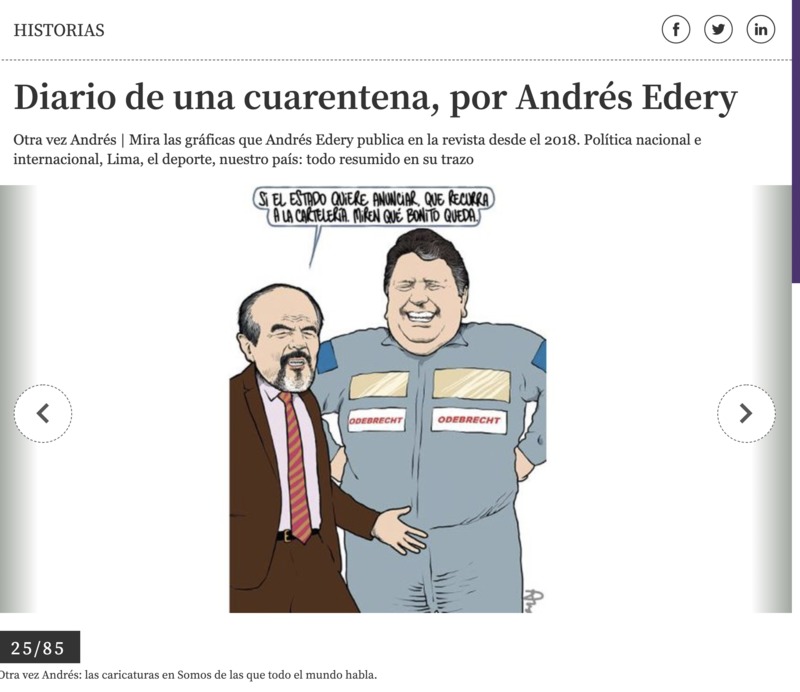 2020-05-17
2020-05-17Third set Diario de una cuarentena, por Andrés Edery
Images 24-40 from Otra vez Andrés | Mira las gráficas que Andrés Edery publica en la revista desde el 2018. Política nacional e internacional, Lima, el deporte, nuestro país: todo resumido en su trazo -
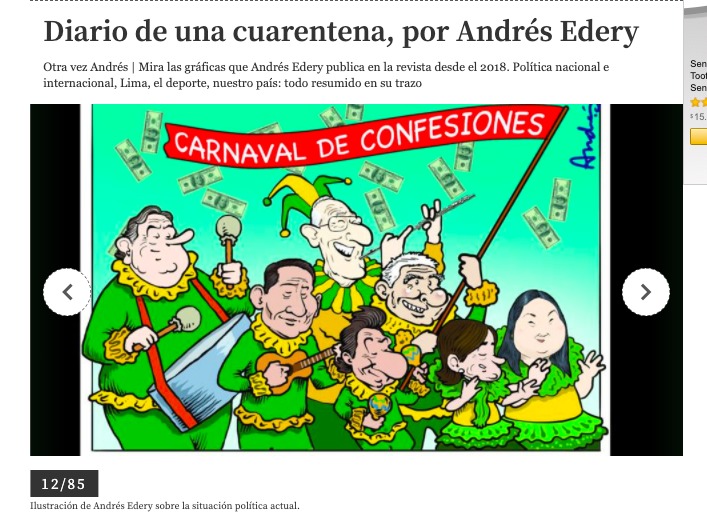 2020-05-17
2020-05-17Second set from Diario de una cuarentena, por Andrés Edery
Images 12-24 in Diario de una cuarentena, por Andrés Edery -
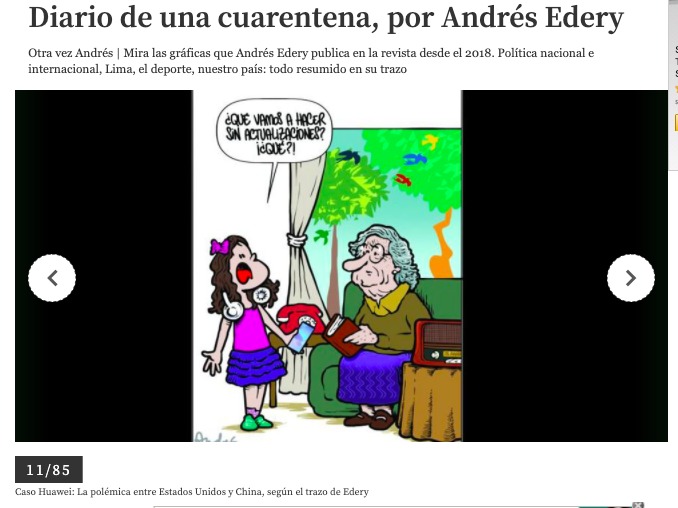 2020-05-17
2020-05-17Caso Huawei: La polémica entre Estados Unidos y China, según el trazo de Edery
Image 11/85 from Diario de una cuarentena, por Andrés Edery -
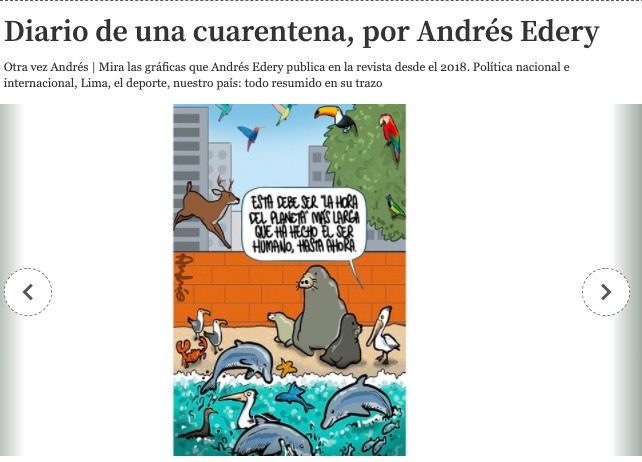 2020-05-17
2020-05-17First 10 images in "Diario de una cuarentena, por Andrés Edery"
The first ten pages of Diario de una cuarentena, por Andrés Edery. It's a collection of 85 images related to local, national, and international news. -
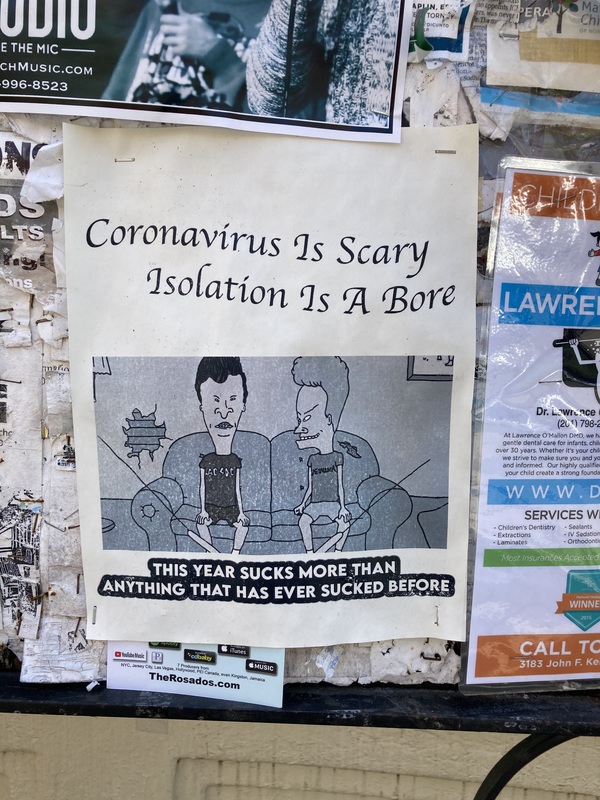 2020-05-17
2020-05-17Beavis and Butthead poster
This is a poster stapled to a bulletin board. It shows Beavis and Butthead with the text "Coronavirus is scary/ isolation is a bore/ This year sucks more than anything has ever sucked before." A local artist has created several related designs is stapled them to telephone poles in downtown Jersey City. *poster: image with words -
 2020-05-17
2020-05-17Evolving Views on Government and Politics
In this story, I talk about how my involvement in politics as an American citizen have evolved and have been shaped by this crisis. I discuss it from my viewpoint, coming from Northern California under Governor Gavin Newsom. I address how certain stat orders have influenced by views on government intervention. -
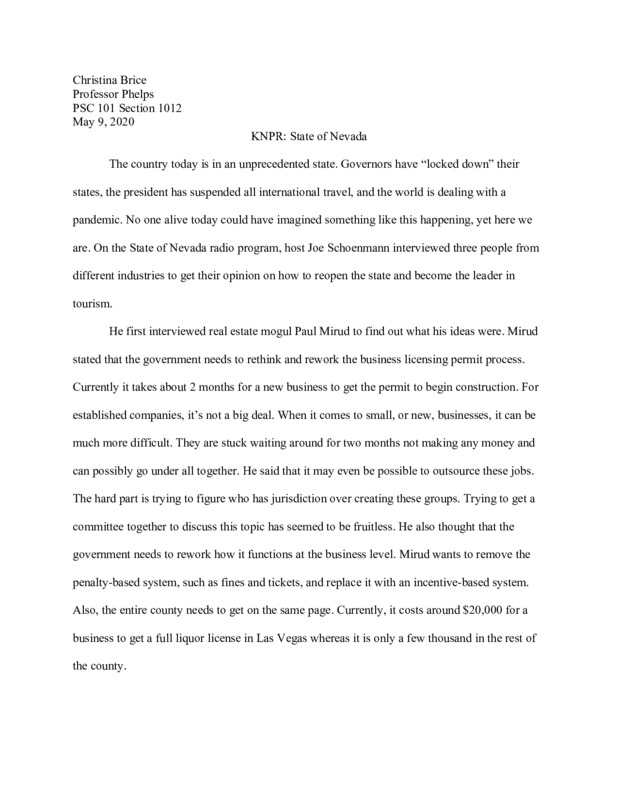 2020-05-17
2020-05-17State of Nevada
#unlv #psc100 #mlphelps -
 2020-05-17
2020-05-17Student paper on federalism and coronavirus
Maya Martinez Dr. Phelps PSC 401D-1001 State Politics May 14, 2020 Federalism in the Wake of the Coronavirus The United States’ founders initially established a system that granted all authority to the states and none to the federal government, in an attempt to protect against tyrannical executives; when this system of government failed, more authority was granted to the federal level of government, with the caveat of the 10th amendment, which is commonly known as the “states’ rights” amendment. It must have been inconceivable at the time to imagine five different types of federalism would emerge from the founders’ decision to divide power in the United States the way they did. The five types of federalism are dual federalism, cooperative federalism, centralized federalism, new federalism, and ad hoc federalism (Greenblatt and Smith). Dual federalism lasted from 1789 to 1933. It was the variety of federalism that distinctly separated responsibilities and jurisdictions, with federal and state authority in clear layers, like chocoflan. Cooperative federalism was the backlash against dual federalism, occurring once it became clear the federal and state levels of government would always end up overlapping and muddled, never following the clear layers dual federalists advocated for. It lasted from 1933 to 1964. The Great Depression was one of cooperative federalism’s biggest developers as well, as local and state governments relied heavily on the federal government’s money and programs to support their people, granting more authority to the federal government in exchange. Centralized federalism was the next version of federal to take place, occurring from 1964 to 1980; this was a shift of power to the federal government, where grants limited the restrictions placed on states, but the amount of money the federal government gave states as well. New federalism occurred as republicans attempted to limit federal authority and return power to the states, from 1980 to 2002. The last and most recent phase of federalism began after in 2002 and is ongoing at the moment; this is ad hoc federalism. Ad hoc federalism is when the federal government either supports federal authority or states’ rights theory depending on which party is involved. The United States under Covid-19 is still in ad hoc federalism. The governor of Nevada instituted a mandatory stay at home order at the end of March, and like other governors, did not sway at the prodding of a president who only desired for the economy to open up without any concern about citizens’ lives. Economic growth is typically touted by both parties, but when it’s combined with a lack of concern over others’ well-being, it is a desire of the Republican Party. An obvious example of the U.S. still being in ad hoc federalism has been the president at first claiming that governors should be the ones in charge of the pandemic response, until he wanted to open the economy, then started talking about how the president was the most significant person in the country (Borger). Trump was obviously bouncing between federal and state responsibilities based off of what policy suited him and his party, which can also be seen in his preferential treatment of Republican states asking for supplies and resisting assisting blue states (Geltzer). Responses from the federal government, like the $1200 stimulus checks, were largely passed through bi-partisan efforts in Congress and had very little to do with Trump. Clearly, this is one executive who doesn’t know how to handle a pandemic, not that anyone should be surprised. States are lucky enough to have governors smart enough to collaborate to purchase supplies together and not let the president divide them, however, states having to take most of the action has led to a highly uneven response to the pandemic that could only occur under federalism. While it is good to imitate states that have flattened the curve early on like Washington, more unitary governments like South Korea have handled the crisis so quickly, it’s become clear there are advantages to centralized power during times of emergency. Work Cited Borger, Gloria. “Trump Wanted States to Take the Lead on Coronavirus. Until He Didn't.” CNN, Cable News Network, 13 Apr. 2020, www.cnn.com/2020/04/13/politics/borger-analysis-federalism-trump/index.html. Cook, Nancy, and Dan Diamond. “'A Darwinian Approach to Federalism': States Confront New Reality under Trump.” POLITICO, www.politico.com/news/2020/03/31/governors-trump-coronavirus-156875. Diamond, Martin. “The Federalist on Federalism: ‘Neither a National Nor a Federal Constitution, But a Composition of Both.’” The Yale Law Journal , vol. 86, no. 1273, 1977. Geltzer, Joshua A. “Perspective | Trump's 'Corona-Federalism' Pits States against Each Other. It's a Disaster.” The Washington Post, WP Company, 8 Apr. 2020, www.washingtonpost.com/outlook/2020/04/08/trump-corona-federalism/. Glick, Noah, et al. “Novel Coronavirus In Nevada: April 8-14.” KUNR, www.kunr.org/post/novel-coronavirus-nevada-april-8-14#stream/0. Greenblatt, Alan. “Federal-State Relations.” CQ Researcher, vol. 28, no. 16, 27 Apr. 2018. Haffajee, Rebecca L., et al. “Thinking Globally, Acting Locally - The U.S. Response to Covid-19: NEJM.” New England Journal of Medicine, 7 May 2020, www.nejm.org/doi/full/10.1056/NEJMp2006740. Law, John. “How Can We Define Federalism.” Perspectives on Federalism, vol. 5, no. 3, 2013. Smith, Kevin B., and Alan Greenblatt. “Chapter 2 Federalism.” Governing States and Localities, 7th ed., CQ Press, 2020, pp. 23–47. Wilson, Chris. “Here's How Quickly Coronavirus Is Spreading in Your State.” Time, Time, 13 May 2020, time.com/5814139/coronavirus-state-data-tracker/. -
 2020-05-17
2020-05-17Primary Concerns
N/A
